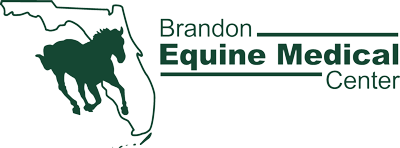Equine Dental Care in Brandon, FL
Click here to read the American Associations of Equine Practitioners (AAEP)’s article: Equine Dentistry: Why Equine Veterinarians are Uniquely Qualified.
Brandon Equine Medical Center utilizes a custom-built 28-foot trailer that is fully equipped to handle all ambulatory services, including dentistry, in safety and air-conditioned comfort.
Dental Care Protocol for Horses
Foals are initially checked for any malformation in the maxilla (skull) or malocclusion of the mandible (jaw) such as wry nose, overjet, overbite, underjet, and underbite. At this time, a long-term plan can be put together if needed to correct any abnormalities. Typically, the first actual dental exam/float is done between 18 to 20 months, and at this point, any wolf teeth will be removed relative to their size.
Between the ages of two and five, the twice-yearly exams allow for monitoring of erupting permanent teeth and extraction of any deciduous (baby) teeth or fragments that are interfering with the bite.
From the ages of five to 20, the prime work years, twice-yearly dental exams maintain the three-point balance of the mouth, thus preventing bit issues, maintaining the correct bite pattern, and maximizing the mastication process (i.e. chewing). These exams routinely can identify broken teeth, jaw fractures, oral injuries, gum disease, cavities, sinus infections, and lodged foreign bodies.
After the age of 20, as the eruption process slows, annual exams are sufficiently providing the horse is maintaining its weight and there are no other underlying issues.
Preventing dental problems from occurring or catching them at an early stage is yet another reason why your horse should have routine dental exams and treatments. Teeth are a non-renewable resource and should be handled with care. Overall, horses’ teeth are a vital part of having a happy and healthy horse.
Rostral Hooks
Rostral hooks are an overgrowth of the first premolar 1/6 or 2/6. It is the first upper tooth visible.
In most cases, if a rostral hook is present, it is very likely that a caudal hook is present (aka a “ramp”).
Typically, horses with this problem tend to have an overjet or an overbite. This is usually completely correctable!
It can be caused by the height at which the horse is fed. If the horse eats off the ground, then all the teeth are in the natural position. Once the horse is fed up higher, as seen in a lot of show barns using hay feeders, the jaw/mandible shifts back, therefore the teeth grind out of occlusion, causing rostral and caudal hooks.
Malocclusions
Equine malocclusion is a misalignment between the upper and lower jaws, resulting in the teeth failing to meet correctly. This can cause the horse pain and lead to problems including weight loss, loss of appetite, other eating problems, and discomfort, leading to poor behavior.
Dental Problem Warning Signs
- Weight loss
- Failure to gain weight
- Difficulty eating
- Refusing certain types of food
- Refusing food completely
- Slow or reluctant to eat
- Quidding or dropping feed
- Packing food into the cheeks
- Food/hay being passed through in manure
- Halitosis (bad breath)
- Facial swelling (under the jaw, side of the face, or above eyes)
- Colic
- Esophageal choke
- Nasal discharge
- Drooling or salivation
- Poor performance
- Difficulty with the bit
- Chewing on the bit
- Head shaking
- Abnormal head movement or carriage
- Tilting the head while being ridden
- Unable to ride in an outline, on the bit, slow to make transitions
- Behavior changes
Incisor Alignment
Correction of the incisors is very important for many reasons. The angle of the incisors can affect the ability of the horse to masticate its food. When the incisors are too long, the surface contact of the premolars and molars is lessened. By reducing the height of the incisors and adjusting the angle, this will put more contact on the premolars and molars. The amount to which the incisors can be adjusted and corrected depends on the age and condition of the horse. Every horse is different, and each case is evaluated prior to any corrective work being performed.
In some severe cases, it may take three or four sessions to gradually correct a malocclusion without damaging the horse’s teeth. This may take up to 18 months in rare instances.
Enamel Hypoplasia
Enamel hypoplasia is a condition where the enamel does not form correctly or is damaged during its development. This will result in a defect of or chipping off of the enamel covering. This will result in the exposure of the underlying dentin. The defect can be isolated to one tooth or area of a tooth or may be widespread throughout the dental arcade. The teeth are only slightly weaker than normal teeth but are much more susceptible to wear, as dentin is not as wear-resistant as enamel is. If aesthetics are a concern and the involved area is not too big, then restoration can be placed over the area. This restoration can be lost as well, but the new bonding agents are fairly effective. If the chance of wear is excessive or the chance of fracture is high, then crown therapy is warranted. These teeth are normally vital; however, before any restorations are placed, it is best to ensure this with dental radiographs.
Expert equine care in Brandon, FL.
From our board-certified horse surgeons and board-certified internists to our professional and courteous staff, at Brandon Equine Medical Center, we are committed to the health and well-being of all breeds and sizes of horses. In the field, as an outpatient, or when admitted to the horse hospital, we treat every horse like our own and every client as the most important.
Contact Info
Phone: 813-643-7177
Fax: 813-643-5877
Email: info@brandonequine.com
Hours
Saturday & Sunday: Closed
Emergency care available: 24/7/365
Location
605 E Bloomingdale Ave
Brandon, FL 33511
Click here for directions.
Have a question?
Our team is here to help! Complete the form below to get in touch.
If this is an emergency, please call us directly at 813-643-7177.

Ready to come see us?
Request your next appointment online in minutes from any device. We look forward to seeing you soon!

